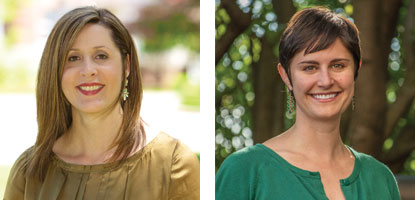
Hosted by the International OCD Foundation (IOCDF), the 23rd Annual OCD Conference gathers a unique group of researchers, therapists, families and individuals with obsessive-compulsive disorder (OCD) from around the globe to share research, techniques and personal experiences with OCD. Over the years, acceptance to present at the conference has become more competitive and attendance has steadily risen.
For this year’s conference in Chicago, Ill., IOCDF received 400 proposals for 140 available workshops, support groups and evening activity slots. Fifteen Rogers representatives will present, including Stephanie Eken, MD, regional medical director, and Amy Mariaskin, PhD, clinical co-director of Rogers Behavioral Health–Nashville.
Sharing New Resources and Experiences
“There are few OCD providers spread out across the country and even across the world,” says Dr. Mariaskin. “We rarely have an opportunity to be in the same place and share knowledge.”
Both doctors have previously presented at the event and enjoy gathering new, enriching knowledge each year—and sharing it as well. “It’s important for us to present because Rogers offers levels of care that very few in the country provide,” says Dr. Eken. “I’ve presented to both clinicians and families because each group wants to know what the treatment experience could be like.”
In addition to academic and clinical presentations, the family member and personal testimonies keep the true purpose of the conference at the forefront. “I love to hear the parent and child presentations,” says Dr. Eken. “I think they’re amazing.”
A Preview of Select Presentations
In collaboration with other professionals, Dr. Mariaskin will help children develop their own powers in the workshop “Superheroes vs. OCD-Villains: Using ACT to Conquer OCD.” “The workshop is based in acceptance and commitment therapy (ACT) and this will be the second year we’re offering it,” she says. “Kids will get to build their own masks and see themselves as superheroes after we give them tools to fight their OCD. Last year the kids had a great time.”
With their peers, Drs. Eken and Mariaskin will also present “Treatment of OCD in Young Children.” “As hard as it is to get anyone on board with treatment that requires confrontation with feared stimuli, with kids it’s even more difficult because they live in the moment,” she says. “It’s hard to convince children that facing their anxiety—which feels terrible at the time—will help them feel better in the future. We will talk about these challenges in treatment and how to make it fun and developmentally appropriate.”
Symptoms of OCD can also present differently in children than in adults. “It’s developmentally appropriate for children to have some rituals and strong preferences,” says Dr. Mariaskin. “We’ll offer advice on how to tease out these symptoms from typical development.”
In the presentation, Dr. Eken will discuss medications for children with OCD and how to avoid overprescribing. “Sometimes, children are given medications that could probably be avoided if therapy was also a component of their care,” she says. “We’ll also offer creative ideas for getting a child to take their medications.”
In a second presentation “Family Accommodation in Children and Adolescents with Co-Occurring OCD and Anxiety and Depressive Disorders,” Dr. Eken will discuss how parents can limit accommodation to their child’s disorders. “So many people with OCD have depression related to their lack of regular functioning,” she says. “We’ve offered a presentation on this topic a few years ago, but now we have more data and research to offer.”
Go online for a complete schedule of Rogers’ OCD Conference presentations.


